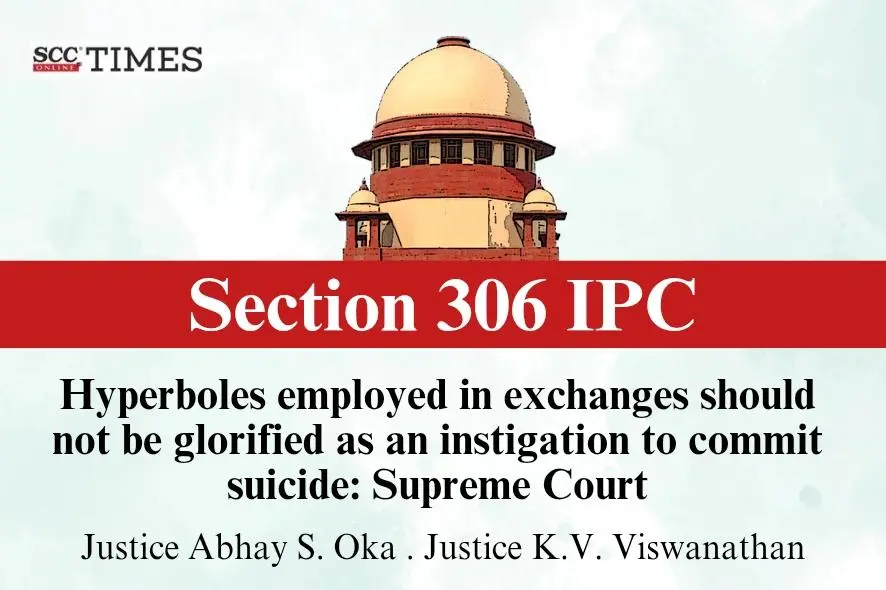Supreme Court: While considering the instant appeal challenging the decision of Madhya Pradesh High Court declining the appellant’s prayer to discharge him from the offences punishable under Section 306 of the Penal Code, 1860; the Abhay S. Oka and K.V. Viswanathan*, JJ., took strict note of casual resorting of Section 306 by the Police. The Court said that while the persons involved in genuine cases where the high threshold under Section 306 is met should not be spared; the provision should not be deployed against individuals, only to assuage the immediate feelings of the distraught family of the deceased. The conduct of the proposed accused and the deceased, their interactions and conversations preceding the unfortunate death of the deceased should be approached from a practical point of view and not divorced from day-to-day realities of life. Hyperboles employed in exchanges should not, without anything more, be glorified as an instigation to commit suicide. “It is time the investigating agencies are sensitised to the law laid down by this Court under Section 306 so that persons are not subjected to the abuse of process of a totally untenable prosecution”.
Background:
A FIR was registered on 31-12-2022 reporting the deceased hanging on a rope noose from a tree. During inquest under Section 174 Cr.P.C, a written suicide note and a mobile were found. The suicide-note mentioned about the deceased being harassed by the appellant Statements of witnesses were recorded. A chargesheet came to be filed on 21-01-2023. The chargesheet mentioned that the appellant had committed offences punishable under Section 306 of the IPC.
From the statement of the witnesses, it transpired that the deceased was staying disturbed for the past few months and when asked he had mentioned to them that the appellant was harassing him with respect to repayment of a loan.
The appellant prayed for discharge from the proceedings. However, based on the material available, the First Additional Sessions Judge, Khargone framed the charges. Aggrieved by the order framing charge, the appellant approached the High Court by filing a revision but the same was dismissed by the impugned order.
Court’s Assessment:
Perusing the facts, statement of the witnesses, forensic evidence etc., the Court firstly took note of Section 306 r/w Section 107 of the IPC. The Court explained that to attract the ingredient of Section 306, the accused should have abetted the commission of a suicide. A person abets the doing of a thing who Firstly – instigates any person to do that thing or Secondly — engages with one or more other person or persons in any conspiracy for the doing of that thing, if an act or illegal omission takes place in pursuance of that conspiracy, and in order to the doing of that thing or Thirdly – intentionally aids, by any act or illegal omission, the doing of that thing.
The Court further explained that in order to bring a case within the purview of Section 306 IPC there must be a case of suicide and in the commission of the said offence, the person who is said to have abetted the commission of suicide must have played an active role by an act of instigation or by doing certain act to facilitate the commission of suicide. Therefore, the act of abetment by the person charged with the said offence must be proved and established by the prosecution before he could be convicted under Section 306 IPC.
The Court relied on M. Mohan v. State, (2011) 3 SCC 626 which had followed Ramesh Kumar v. State of Chhattisgarh, (2001) 9 SCC 618, wherein the Supreme Court had held that to satisfy the requirement of instigation the accused by his act or omission or by a continued course of conduct should have created such circumstances that the deceased was left with no other option except to commit suicide. It was also held that a word uttered in a fit of anger and emotion without intending the consequences to actually follow cannot be said to be instigation.
Applying the afore-stated principle on the instant case, the Court pointed out that there are no grounds to frame charges under Section 306 IPC against the appellant. A reading of the suicide note revealed that the appellant was asking the deceased to repay the loan guaranteed by the deceased. It could not be said that the appellant by performing his duty of realising outstanding loans at the behest of his employer can be said to have instigated the deceased to commit suicide. The Court further expressed doubts over the registration of FIR in the matter after delay of 2 months 20 days.
Perusing the instant matter, the Court sternly pointed out that from time to time the Court has reiterated the higher threshold mandated by law for Section 306 IPC (Now Section 108 read with Section 45 of the Nyaya Sanhita, 2023). However, the same has not been followed.
The Court said that the Trial Courts also should exercise great caution and circumspection and should not adopt a play it safe syndrome by mechanically framing charges, even if the investigating agencies in a given case have shown utter disregard for the ingredients of Section 306 of the IPC.
Hence the Court deemed it fit to discharge the appellant from proceedings in Sessions Case pending on the file of First Additional Sessions Judge, and quashed and set aside the said proceedings, after finding that that the case against the appellant is groundless for framing of a charge under Section 306 of the IPC.
CASE DETAILS
|
Citation: Appellants : Respondents : |
Advocates who appeared in this case For Petitioner(s): For Respondent(s): |
CORAM :









